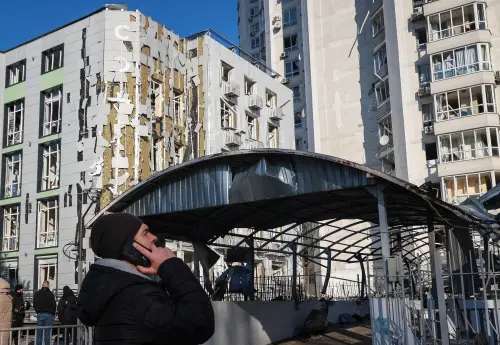KYIV, Feb 20 (Reuters) - Ukrainian officials reported that Russia launched 161 drones and a dozen missiles overnight, targeting gas infrastructure in northeastern Kharkiv region and hitting power supply in the southern Odesa region for the second consecutive night on Thursday.
This attack forms part of an escalated assault on Ukraine's energy system over the past month, taking place as Russia engages in discussions regarding its conflict in Ukraine with the new U.S. administration led by President , who strongly opposes Russia's invasion.
Ukraine's Energy Minister German Galushchenko condemned the attacks as an attempt to disrupt gas production crucial for citizens' domestic needs and centralized heating. The Ukrainian military disclosed that 80 drones were downed while 78 were "lost," possibly due to electronic countermeasures. Additionally, Russia fired approximately 14 missiles at what it labeled as "critical infrastructure" in Kharkiv.
The primary gas production capacity of Ukraine, meeting close to half of the country's gas demands, is situated in the frontline regions of Kharkiv and Poltava bordering Russia.
Previously concentrating on Ukraine's electricity sector, Russia has recently increased assaults on gas storage sites and production fields. Since the outset of February, Ukraine's gas imports have surged nearly tenfold following Russian missile attacks on gas facilities.
State data from the Ukrainian gas transmission system operator showed imports amounting to 22.20 million cubic meters (mcm) on Thursday, down from 25.80mcm on Wednesday and a peak of 26.7mcm on Tuesday.
In the Odesa region, a significant drone strike wounded one individual, leading to power outages for 5,000 residents, as revealed by prosecutors on the Telegram messenger app. The attack inflicted damage on administrative and residential structures, along with a private storage facility.
As of Thursday morning, around 49,000 customers were without power, according to Odesa regional governor Oleh Kiper, noting that engineers had reinstated power to two heating boiler houses serving homes affected by the previous attack, which impacted 500 buildings.
While Russia claims its assaults on Ukraine's energy infrastructure target military objectives and not civilians, thousands have lost their lives since Moscow's invasion nearly three years ago.
